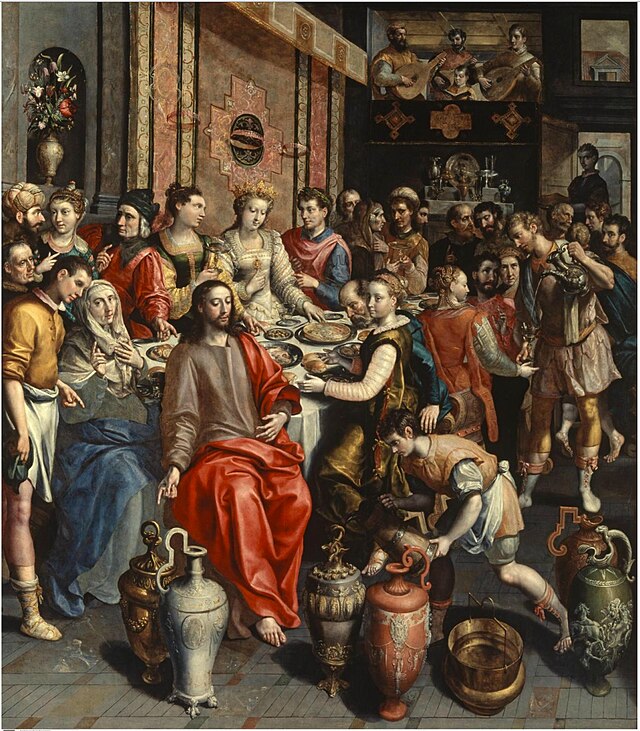Alcohol in the Bible: Difference between revisions - Wikipedia
 Article Images
Article Images
Line 3:
[[Alcoholic beverage]]s appear repeatedly in [[biblical literature]], from [[Noah]] planting a vineyard and becoming inebriated in the [[Hebrew Bible]], to [[Jesus]] in the [[New Testament]] miraculously making copious amounts<ref>Six pots of thirty-nine [[litre]]s each = 234 liters = 61.8 [[gallon]]s, according to Seesemann, p. 163.</ref> of wine at the [[marriage at Cana]] and later incorporating wine as part of the [[Eucharist]]. Wine is the most common alcoholic beverage mentioned in biblical literature, where it is a frequent source of symbolism,<ref name="ISBEWine" /> and was an important part of daily life in biblical times.<ref name="ISBEWine">B. S. Easton (1915b).</ref><ref name="Broshi 1984, p. 33">Broshi (1984), p. 33.</ref><ref>Broshi (1986), p. 46: In the biblical description of the agricultural products of the Land, the triad 'cereal, wine, and oil' recurs repeatedly (Deut. 28:51 and elsewhere). These were the main products of ancient Palestine, in order of importance. The fruit of the vine was consumed both fresh and dried (raisins), but it was primarily consumed as wine. Wine was, in antiquity, an important food and not just an embellishment to a feast.... Wine was essentially a man's drink in antiquity, when it became a significant dietary component. Even slaves were given a generous wine ration. Scholars estimate that in ancient Rome an adult consumed a liter of wine daily. Even a minimal estimate of 700g. per day means that wine constituted about one quarter of the caloric intake (600 out of 2,500 cal.) and about one third of the minimum required intake of iron."</ref> The inhabitants of ancient [[Palestine]] also drank beer, and wines made from fruits other than grapes, and references to these appear in scripture as well.<ref name="WaltkeP505">Waltke (2005), p. 505.</ref>
On the whole, biblical literature displays an ambivalence toward intoxicating drinks, considering them both a blessing from God that brings joy and merriment and potentially dangerous beverages that can be [[sin]]fully abused.<ref name="WaltkeP127">Waltke (2005), p. 127.</ref><ref>Fitzsimmonds, p. 1255: "These two aspects of wine, its use and its abuse, its benefits and its curse, its acceptance in God's sight and its abhorrence, are interwoven into the fabric of the [Old Testament] so that it may gladden the heart of man (Ps. 104:15) or cause his mind to err (Is. 28:7), it can be associated with merriment (Ec. 10:19) or with anger (Is. 5:11), it can be used to uncover the shame of Noah (Gn. 9:21) or in the hands of Melchizedek to honor Abraham (Gn. 14:18).... The references [to alcohol] in the [New Testament] are very much fewer in number, but once more the good and the bad aspects are equally apparent...."</ref><ref name="RaymondP25">Raymond, p. 25: "This favorable view [of wine in the Bible], however, is balanced by an unfavorable estimate.... The reason for the presence of these two conflicting opinions on the nature of wine [is that the] consequences of wine drinking follow its use and not its nature. Happy results ensue when it is drunk in its proper measure and evil results when it is drunk to excess. The nature of wine is indifferent."</ref><ref name="bible-history.com">http://www.bible-history.com/isbe/D/DRUNKENNESS/</ref><ref>McClintock and Strong, p. 1016: "But while liberty to use wine, as well as every other earthly blessing, is conceded and maintained in the Bible, yet all abuse of it is solemnly condemned."</ref> The relationships between Judaism and alcohol and [[Christianity and alcohol]] have generally maintained this same tension, though Christianity saw a number of its adherents, particularly around the time of [[Prohibition]], rejecting alcohol as inherently evil. Viewing the issue in the context of revealed Scripture in general, the Holy Qur'an, on the other hand, forbids the use of alcohol and intoxicants altogether, although admittedly, Prophet Muhammad early in his mission, respecting the culture of the previous traditions, allowed his followers to continue its use until it was prohibited.
The original versions of the books of the bible use several different words for alcoholic beverages: at least 10 in [[Hebrew]], and five in [[Greek language|Greek]]. Drunkenness is discouraged and not infrequently portrayed, and some biblical persons abstained from alcohol. Alcohol is also used symbolically, in both positive and negative terms. Its consumption is also in places prescribed for religious rites or medicinal uses.